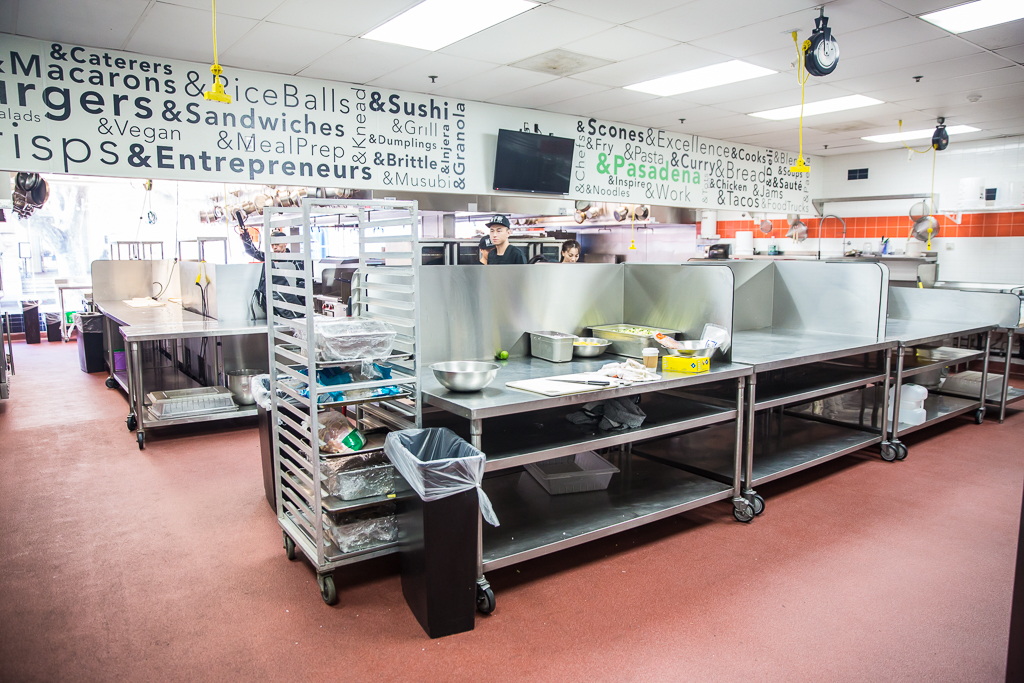


High real estate prices and expensive kitchen equipment are two of the biggest barriers to opening and operating a thriving restaurant business. But what if those weren't factors?

High real estate prices and expensive kitchen equipment are two of the biggest barriers to opening and operating a thriving restaurant business. But what if those weren't factors? That's a question six independent restaurant concepts are testing by sharing space and labor costs via Kitchen United, an LA-based commercial kitchen that rents space starting at $25 per hour.
"It's more than renting a space and much less than being a franchisee," Jim Collins, Kitchen United's CEO, said in an interview with FastCasual. "KU provides a restaurant solution, not just a kitchen. So, there are services, software products, etcetera, that restaurants utilize as a part of their KU membership. They can tailor these services to meet their needs in consultation with our team, but the spaces are designed to be more or less turnkey in all respects."
 |
KU provides all standard equipment, but if specialized equipment is needed to make afood specificonly to one restaurant, that brand must provide it |
How it works
As of now, there are six brands operating within the Pasadena KU facility, Collins said. Since Pasadena is a pilot location, each restaurant shares a larger room with another brand but has its own space within the rooms. In future locations, each will have its own four-wall space. And each line is licensed and maintained separately for health department standards, etc.
"They also have their own sinks, refrigeration, etc. So, there is no co-mingling of any kind," Collins said.
Kitchen United has its own inventory people, kitchen helpers, cleaners, etc., allowing brands to employ a lean team, and it also provides all standard equipment. Each brand, however, is responsible for any specialized equipment.
Wait times are between 10 15 minutes, Collins said, because of the company's sophisticated, integrated system that consolidates all orders into a single point both in the facility and on the restaurant hotlines.
"KU monitors error conditions such as order not fired, fire time, etcetera, and works with restaurants to identify and address operational issues," he said.
The location also has a small retail storefront where consumers can come in for pick-up or to order from a kiosk. Future centers may include food hall-like seating if this makes sense in a particular location, said Collins, who described the business model as not only perfect for caterers, pop-up concepts and start-ups but also for more established brands looking to expand their delivery services to a new area.
"It's a flexible, scale-able and an affordable way to rent space when restaurants need it for as little as two hours to over 80 hours a month," he said
Marc Canter, the fourth-generation owner of Canter's Deli, hooked up with KU for that very reason.
"We decided to partner with KU because it was not just a delivery-only location," Canter said about the 9,000-square-foot space. "They are able to have people walk in and eat in or take it to go. Also, Pasadena was in need of a great deli."
Canter also loves that he can run the business using just a couple employees, which keeps down labor costs.
"We can handle about 100 orders a day with just two employees, "he said. "So, at some point, we will add one more when it's needed, but it will pay for itself with that many orders. We could fit four employees if needed at some point."
Although he wouldn't disclose how much he pays to be a part of KU, Canter said it was a lot less than having his own brick-and-mortar space.
Joining KU
In order to become one of KU's brands, a concept must apply to be in a future location. If accepted they sign up as a member and can start taking advantage of the services. Future locations will be between 10,000 and 20,000 square feet, said Collins, who describes Kitchen United as a virtual restaurant.
"In the same way Tesla reimagined what a car dealership could look like — smaller footprint, efficient use of space — Kitchen United is reimagining what it means to be a food entrepreneur," he said.
Cherryh Cansler is VP of Events for Networld Media Group and senior editor of FastCasual.com. She has been covering the restaurant industry since 2012. Her byline has appeared in Forbes, The Kansas City Star and American Fitness magazine, among many others.
Subscribe now to the Restaurant Operator Daily, which brings you the top stories from Fast Casual, Pizza Marketplace, and QSR Web.
Privacy PolicyOctober 13-15, 2024 | Denver